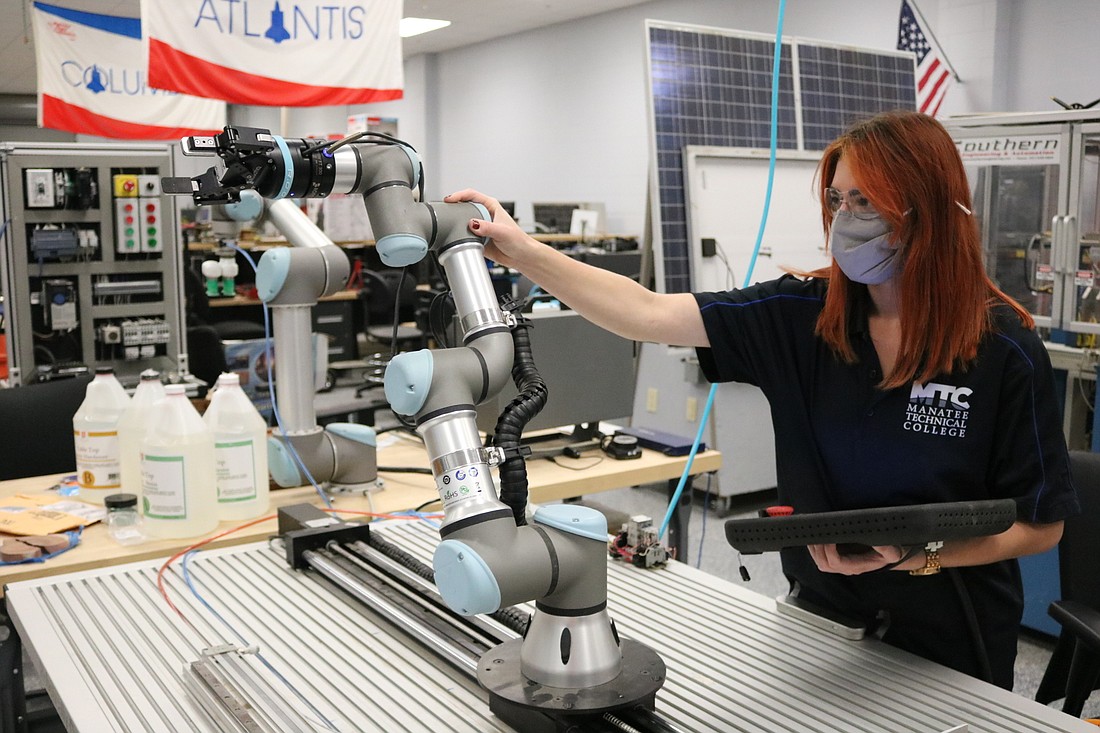- July 13, 2025
-
-
Loading

Loading

Since the COVID-19 pandemic started, New England Machinery, a Bradenton-based manufacturer, has seen an increase in business, which has led to a need for more employees.
Judith Nickse, the owner of New England Machinery, said her company has hired six people in the past two months to keep up with demand and is looking for machine builders, sales people, individuals for the machine shop and others.
But where does the company find those workers?
Nickse has hired three Manatee Technical College CNC Production Technology program graduates in the past and said the college’s new rapid credentialing project will provide an opportunity for her to potentially hire more graduates soon.
“I think there is a big demand for what they’re teaching,” Nickse said of MTC. “I see an increase in need for technical skills in this area as Manatee County and Sarasota County are not only service-industry related, but there is a booming manufacturing sector in this part of the state. I think schools like them serve an important role for all of us.”
The rapid credentialing project is a way for MTC to help people whose employment has been adversely affected by the COVID-19 pandemic to get back into the workforce.
Starting in January 2021, people who are unemployed and seeking employment, underemployed or furloughed can enroll in MTC’s new rapid credentialing project that will provide training for in-demand workforce and career and technical education credentialing and certificate programs.
“There are too many people who have been hit with economic hardship because of the coronavirus, and this is an excellent opportunity to get some new training in a career that has potential for possibly earning them more money and hopefully has less of a chance of them being laid off,” said Maura Howl, the supervisor for communications and grants management.
In October, Manatee County’s unemployment rate was 5.2%. In the same month last year, Manatee County’s unemployment rate was 2.9%.
MTC received $298,618 in funding through the state’s Emergency Education Relief Fund under the federal coronavirus relief bill to begin a rapid credentialing project.
Through rapid credentialing, Howl said MTC expects that approximately 160 people, depending on which program they choose, will be able to complete training in certain programs between five weeks and six months. They will then receive assistance in job placement.
American Torch Tip, a Bradenton-based manufacturer of welding and cutting equipment, consumables, torches and accessories, works with MTC to hire graduates from the college’s CNC Production Technology program.
“The students that graduate from their programs have the technical skills and knowledge to hit the ground running,” said Alicia Larkins, the director of human resources for American Torch Tip. “They’re the ones needed to impact our busy manufacturing operations. It can be a challenge to find top CNC machinist hires in our area, and MTC is a great partner to find local machining talent.”
The grant funding covers 80% of the total project cost of $373,272. The remaining 20% is covered by cash matches from CareerEdge Funders Collaborative, Perkins V grant and students.
Student costs differ per program but equal less than 5% of the total grant project.
Howl said applicants don’t need to qualify for normal financial aid to qualify for a rapid credentialing program.
Applicants can be people who already have a degree but want to find a new way to make money or people who need training in another field. The requirement is that the person must be unemployed and seeking employment, have been laid off or furloughed, or are underemployed.
“This is an opportunity that can make the difference between putting food on the table or not,” Howl said.
MTC selected nine programs across the Main Campus and East Campus to be included in the project. The programs selected were advanced manufacturing and production technology, applied cybersecurity, CNC production specialist, emergency medical technician, medical laboratory assisting, nursing assistant, patient care technician, phlebotomy and plumber helper.
When looking at which programs to select, Howl said time played a major factor. Project organizers wanted students to complete training quickly, so they could get a job and start working again.
Another factor considered was job demands. Most of the programs are for essential workers, including manufacturing and several positions in the medical field. The high demand for these jobs means there’s less of a chance someone could be laid off during difficult financial times, such as the pandemic.
“I have been here 17 years, and in my 17 years, we haven’t had a layoff,” Nickse said. “I think that’s a pretty strong record.”
The programs selected also lead people to middle- to high-wage employment opportunities.
“We wanted to meet the needs of the community and meet the needs of the students at the same time,” said Jennifer Gilray, an assistant director at MTC and a rapid credentialing project coordinator.
Howl said MTC will continue the project after the spring semester as long as there is funding available.